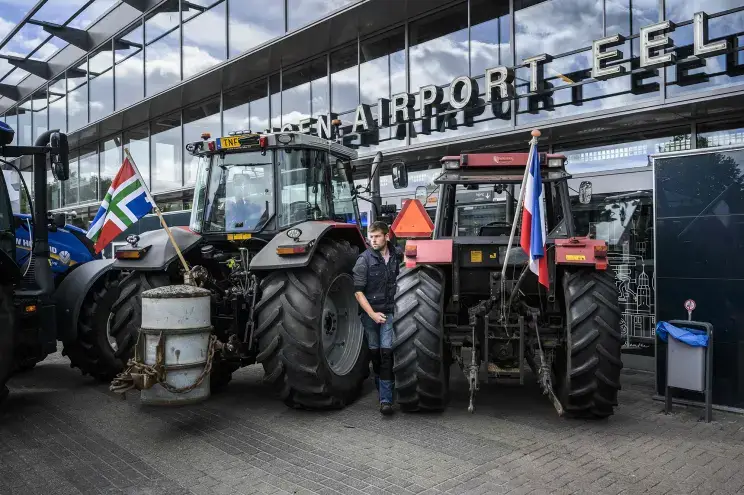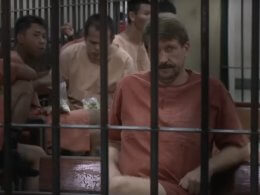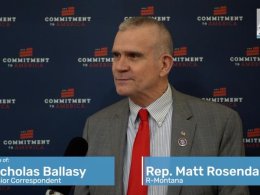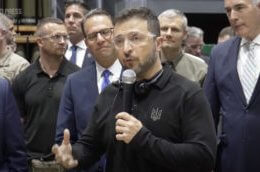Thousands of farmers in the Netherlands protesting proposed emissions reduction rules targeting their fertilizer and livestock were joined this weekend by groups in Germany, Italy, Spain, and Poland amid fears that the so-called “anti-farming” policies could soon spread to their countries as well.
Similar rules have caused unrest in other countries, notably Sri Lanka, which was forced to repeal its ban on all chemical fertilizers after less than a year and now faces massive political upheaval.
Farming is a critical sector of the Dutch economy. Despite being just slightly larger than the state of Maryland, the Netherlands is the world’s second-largest exporter of agricultural goods, behind only the United States, and its exports in that sector totaled roughly 105 billion euros last year alone.
Farm and agriculture groups in the country have slammed the Dutch government’s plans as “unrealistic" — noting that the country is home to nearly 54,000 agricultural businesses.
"This is not going to work," LTO Nederland Chairman Sjaak van der Tak, whose organization represents 35,000 farmers, said in response to the new targets.
Others fear a reduction in the Dutch agriculture sector will result in higher-cost, less-efficient production in other parts of the world.
“I think there are a lot of, sort of delusional ideas among environmental advocates, environmental NGOs, and academics that get picked up in places like Europe by policymakers, who then try to sort of impose [them] onto farmers and other folks who have to actually live under these policies,” Ted Nordhaus, the executive director of the Breakthrough Institute, a global research center, said in an interview. “And the reaction we're seeing [from the protesters] is pretty representative of the degree to which these ideas are pretty out of touch with the basic, biochemical economic realities of the global agriculture system.”
And since the Dutch are widely considered to be among the most environmentally efficient livestock producers, Nordhaus said, the new reduction targets are likely to redistribute production — outsourcing it to other countries that require more land, and likely, produce higher nitrogen pollution overall.
“Global agriculture, in some sense, is zero-sum,” Nordhaus said. "So, if productivity and yields go down in the Netherlands, it means that the demand gets taken up somewhere else."
The wave of Dutch demonstrations is a response to proposed climate change policies introduced last month by the Dutch parliament, which seek to curb farmers’ use of fertilizer and reduce the amount of livestock they can own in an effort to reduce their emissions of nitrogen oxide and ammonia dramatically by the year 2030.
Since those emissions are produced by livestock, the Dutch plans call for a 30% reduction in livestock, an amount lawmakers say is necessary to meet the country’s climate goals.
The Netherlands is facing heightened pressure to comply with the EU’s Nitrate Directive, which seeks to regulate nitrate pollution within the bloc and protect against harmful emissions in so-called "red zones," the protected network of endangered species habitats that stretches across the EU.
The Netherlands is the EU’s largest emitter of nitrogen oxide and ammonia and was ordered by the European Court of Justice in 2018 to address the problem.
In May 2019, the Council of State court ruled that the Netherlands's plan to reduce excess nitrogen was “in breach of EU law” and characterized its calculation of the way nitrogen was being released as “questionable.”
But in some areas, the government's cuts could reach as high as 70% — which Dutch farmers argue would force many to either scale back production massively or shut down their operations completely.
The proposed regulations have been met with disdain by farmers in the country, touching off protests in major cities, where crowds have often grown into the tens of thousands.
Last week, some 40,000 farmers massed in tractors and trucks in Gaarkeuken, a key agricultural center in the north, to block all ship traffic at the Princess Margriet Canal. Others used tractors to halt activity at various supermarket distribution centers in the area and to gather outside the country's parliament building while lawmakers voted on the regulations.
Under the new emissions regulations, regional authorities will have a 12-month period to draft proposals to meet these new targets.
But critics fear that by moving too quickly, the Netherlands could risk making some of the same mistakes as Sri Lanka, whose abrupt pivot to organic farming last April went catastrophically wrong — sending domestic production plummeting, inflation soaring, and reversing the country’s long-fought economic gains. Sri Lanka’s experiment was widely considered to be a massive failure, and within eight months, the policy had been almost completely lifted.
LTO Nederland said in a statement that the new policy has delivered "setback after setback" for farmers.
"Loss of derogation is a black scenario for circular agriculture,” the group said. “It means that a smaller part of the total required soil fertilization may come from fertile animal manure and, therefore, greater dependence on artificial fertilizer and thus gas. This will cost approximately 10,000 to 20,000 euros extra for farmers without improving the environment.”
In announcing the tougher emissions regulations last month, Dutch officials said they will bring “clarity” to their farmers as to “whether and how they can continue their businesses.”
Dutch Prime Minister Mark Rutte “sees three options for farmers: become [more] sustainable, relocate or stop,” he added.










